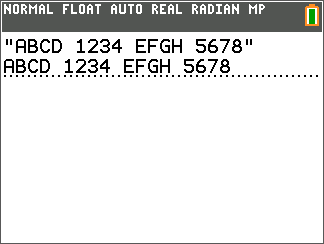Entering and Using Strings
What Is a String?
A string is a sequence of characters that you enclose within quotation marks. On the TI‑84 Plus CE, a string has two primary applications.
|
•
|
It defines text to be displayed in a program. |
|
•
|
It accepts input from the keyboard in a program. |
Characters are the units that you combine to form a string.
|
•
|
Each number, letter, and space counts as one character. |
|
•
|
Each instruction or function name, such as sin( or cos(, counts as one character; the TI‑84 Plus CE interprets each instruction or function name as one character. |
Entering a String
To enter a string on a blank line on the home screen or in a program, follow these steps.
|
1.
|
Press ƒ W to indicate the beginning of the string. |
|
2.
|
Enter the characters that comprise the string. |
|
•
|
Use any combination of numbers, letters, function names, or instruction names to create the string. |
|
•
|
To enter a blank space, press ƒ O. |
|
•
|
To enter several alpha characters in a row, press ƒ 7 to activate alpha-lock. |
|
3.
|
Press ƒ W to indicate the end of the string. |
ãstringã
|
4.
|
Press Í. On the home screen, the string is displayed on the next line without quotations. An ellipsis (...) indicates that the string continues beyond the screen. To scroll to see the entire string, press ~ and |. |

Note: A string must be enclosed in quotation marks. The quotation marks do not count as string characters.

